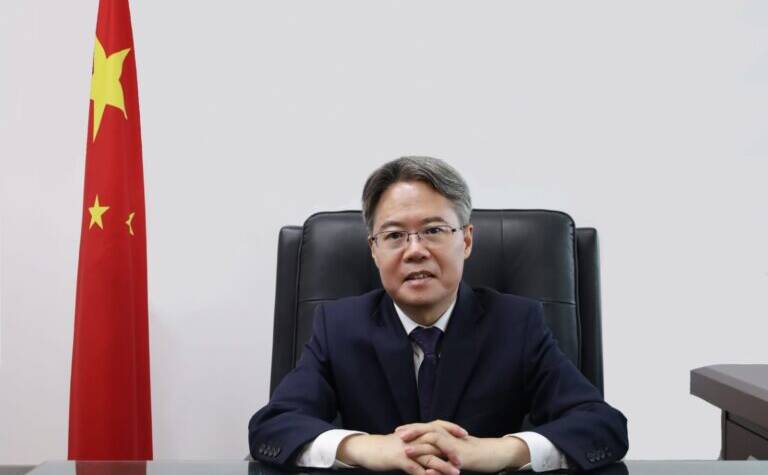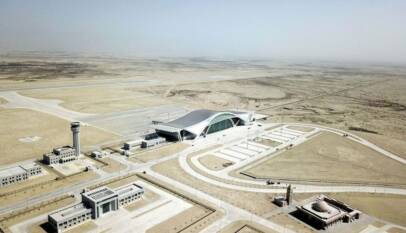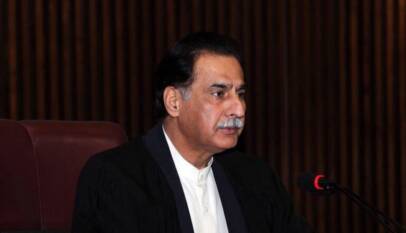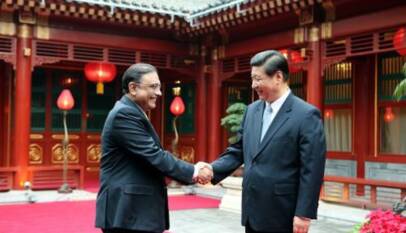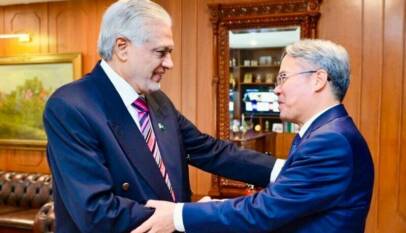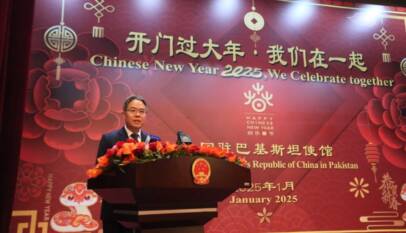Ambassador Jiang Zaidong highlights the contemporary value of Five Principles of Peaceful Coexistence
In an interview with APP, Chinese Ambassador to Pakistan Jiang Zaidong highlighted the enduring significance of the Five Principles of Peaceful Coexistence, especially in the context of building a global community with a shared future as advocated by President Xi Jinping. He emphasized the historical and contemporary relevance of these principles, their role in fostering international cooperation, and China’s commitment to promoting peace, development, and security globally. Jiang also discussed the outcomes of Pakistani Prime Minister Shehbaz Sharif’s recent visit to China, which strengthened bilateral strategic and practical cooperation, especially under the Belt and Road Initiative, while also addressing security concerns and mutual support in international platforms like the UN and SCO.
Chinese ambassador to Pakistan Mr. Jiang Zaidong’s interview with APP
Question1:On June 28, the Conference Marking the 70th Anniversary of the Five Principles of Peaceful Coexistence was held in Beijing. Former political leaders, experts and scholars, friendly people, and business representatives from more than 100 countries, including Pakistan, and international and regional organizations attended the conference, which fully reflects China’s strong international influence, charisma and shaping power. As a iron-clad friend of China, Pakistan is proud of it. As the Five Principles of Peaceful and Coexistence were proposed 70 years ago, how the contemporary value is demonstrated today?
Answer: Given the significant historical contributions and value of the Five Principles of Peaceful Coexistence, China has placed great importance on hosting the Conference. President Xi Jinping attended the conference and delivered an important address. He expounded on the essence of the Five Principles of Peaceful Coexistence and their implications for our times, pointed the direction for building a community with a shared future for mankind, and voiced a strong message of the Global South to work with people around the world for a better future, which fully manifests President Xi Jinping’s broad historical vision, outstanding political wisdom, strong responsibility and profound love for the international community. His address provides us a fundamental guideline for drawing on the historical wisdom of the Five Principles of Peaceful Coexistence, and building consensus and form synergy for tackling the tough challenges the world faces today.
Regarding how to demonstrate the contemporary value of the Five Principles of Peaceful Coexistence, President Xi Jinping fully elaborated it in the above important address, which was highly agreed by all parties present. Moving from the Five Principles of Peaceful Coexistence to building a community with a shared future for mankind is the distinctive theme and important consensus of this commemorative conference. 70 years ago, Chinese leaders first proposed the Five Principles of Peaceful Coexistence, giving a historic answer to the very important question of how to handle state-to-state relations properly. Today, 70 years later, faced with the major issue of “what kind of world should we build and how should we build it”, President Xi Jinping put forward the vision of building a community with a shared future for mankind, providing a new answer in the era. This is the best way to inherit, advance and enrich the Five Principles of Peaceful Coexistence under new circumstances. It has and will continue to push the world towards a bright prospect of peace, security, prosperity and progress, and demonstrates the contemporary value of leading global development and the advancement of human society.
Question 2: The Beijing Declaration of the Conference Marking the 70th Anniversary of the Five Principles of Peaceful Coexistence pointed out that The Five Principles of Peaceful Coexistence are showing greater vitality amidst global transformations not seen in a century. Building a community with a shared future for mankind is a historical necessity for carrying forward the Five Principles of Peaceful Coexistence under the new circumstances, and enriches the Five Principles of Peaceful Coexistence with the imperatives of the new era. The Vision of Building a Community with a Shared Future for Mankind carries forward the essence of the Five Principles of Peaceful Coexistence, and also makes innovation and development, pointing the direction for all countries to work together on the Earth, the planet we call home. How to further promote the building of a community with a shared future for mankind on the basis of carrying forward the spiritual connotation of the Five Principles of Peaceful and Coexistence?
Answer: President Xi Jinping put forward the vision of building a community with a Shared Future for mankind, based on the reality that all countries have a shared future and intertwined interests and setting a new model of equality and coexistence for international relations. It responds to the world’s prevailing trend of peace, development, cooperation and win-win, and opens up new prospects for peace and progress. It also keeps pace with the historical trend toward multi-polarity and economic globalization, and inspires new ways to achieve development and security. This vision aligns with the shared aspirations of all nations, and charts the course for the development of world civilization, which has been widely welcomed by people around the world, and has become a flag spearheading the trend of the times.
Through in-depth exchanges at the conference, all of the attendees agreed that the concept of building a community with a shared future for mankind keeps up with the Five Principles of Peaceful Coexistence. Under the circumstances of the new era, we are willing to work with all countries to jointly promote the spirit of the Five Principles of Peaceful Coexistence and continue to work together to promote building a community with a shared future for mankind in the following aspects: First, we must uphold the principle of sovereign equality, jointly advocate an equal and orderly multipolar world, ensure that all countries can find their own place in the multipolar system, and oppose the law of the jungle; second, we must consolidate the foundation of mutual respect, respect each other’s core interests and major concerns, respect the development path and institutional model independently chosen by the people of each country, and oppose imposing one’s will on others; third, we must realize the vision of peace and security, share the responsibility for maintaining peace, jointly implement the Global Security Initiative, and promote development and security through cooperation; fourth, we must gather the driving force for building prosperity together, jointly advocate inclusive economic globalization, enhance the high-quality construction of the Belt and Road Initiative, implement the Global Development Initiative, and let the people of all countries share the benefits of development; fifth, we must uphold the concept of fairness and justice, jointly advocate the global governance concept of extensive consultation, joint construction and sharing, and implement the true multilateralism; sixth, we must show an open and inclusive mind, jointly implement the Global Civilization Initiative, and promote mutual understanding and friendship among the people of all countries and mutual appreciation of various civilizations.
Question 3:From the Five Principles of Peaceful Coexistence to building a community with a shared future for mankind, China has always been unremitting in its pursuit of a fair and reasonable international order. We believe that in the new era, the Five Principles of Peaceful Coexistence will surely yield new opportunities, and building a community with a shared future for mankind will be further deepened, guiding all countries in the world to achieve peace, stability, development and prosperity. The Beijing Declaration of the Conference Marking the 70th Anniversary of the Five Principles of Peaceful Coexistence mentioned that the Global South is a key force in advocating and practicing the Five Principles of Peaceful Coexistence. So as an important member of the Global South, how will China play its role in the Global South in future?
Answer:China is the world’s largest developing country and a natural member of the Global South. In recent years, the Global South stands out with a strong momentum, playing a vital role in promoting human progress. In the economic field, the contribution of the Global South to world economic growth in the past two decades has been as high as 80%, and the global share of GDP has increased from 24% to more than 40% in the past 40 years, which has profoundly redrawn the world economic map. In the political field, the Global South countries are no longer the silent majority on the international stage, but have made their own voices firmly and loudly, and are regarded as the key force for the transformation of the international order and the hope for the world in changes unseen in a century.
President Xi Jinping pointed out at the Conference that the Global South should take the lead in building a community with a shared future for mankind, and put forward the open and inclusive cooperation initiative for the Global South. China is ready to work with all countries to implement this important initiative, and jointly act as the staunch force for peace, the core driving force for opening and development, the construction force of global governance, and the advocates for exchange among civilizations, making new contributions to strengthening South-South and North-South cooperation, and promoting human progress. President Xi Jinping also announced a series of measures to better support Global South cooperation, including establishing a Global South research center, providing 1,000 scholarships under the Five Principles of Peaceful Coexistence Scholarship of Excellence and 100,000 training opportunities to Global South countries in the coming five years. All these measures show China’s firm determination to promote the development and revitalization of the Global South. We are ready to work with Global South countries including Pakistan to actively implement those measures and inject stronger impetus into the common development and cooperation of the Global South.
Question 4:Both Pakistan and China are countries in the Global South, and the relationship between the two countries sets an example of exchanges between countries. Not long ago, Prime Minister Shehbaz Sharif paid his first official visit to China after the establishment of the new government, which engendered widespread attention and warm response in Pakistan. Pakistan sincerely hopes to strengthen cooperation with China in the future, continue the traditional friendship between the two countries, and deepen mutually beneficial cooperation. Because by working together with China, Pakistan can better safeguard its independence and materialize national prosperity. How do you evaluate the outcomes of Prime Minister Shehbaz Sharif’s visit to China, and what are your plan to implement these outcomes?
Answer:Prime Minister Shehbaz Sharif’s visit to China realized the first face-to-face meeting between the top leaders of our countries after the establishment of the new Pakistani government. It is of great significance to plan and promote the all-weather strategic cooperation between China and Pakistan in the new era. With the dedicated preparation and close cooperation of both sides, the visit achieved the expected goals and fruitful results, which are mainly reflected in the following aspects:
First, it strengthens the strategic cooperation and provides guideline for developing China-Pakistan relationship. Practice has proved that the strategic guidance of the leaders of the two countries is the fundamental safeguard for the long-lasting and strong China-Pakistan cooperation. In particular, President Xi Jinping always attaches great importance to the development of China-Pakistan relations and personally promotes it. When meeting with Prime Minister Shehbaz Sharif, President Xi pointed out that China is willing to firmly support Pakistan, strengthen the ties of our cooperation, deepen strategic coordination, and accelerate the building of an even closer China-Pakistan community with a shared future in the new era. Premier Li Qiang said that China is willing to carry forward the traditional friendship and expand practical cooperation with Pakistan. Chairman of the National People’s Congress (NPC) Standing Committee Zhao Leji said that the National People’s Congress of China is willing to enhance friendly exchanges with the Pakistani Parliament. Prime Minister Shehbaz Sharif highly agreed with the Chinese leaders’ opinions and emphasized that Pakistan will unswervingly be China’s most reliable friend and cooperative partner. The leaders of the two countries reached important consensus, which further points out the direction and provides guidance for us to promote China-Pakistan cooperation.
Second, it deepens practical cooperation and reinvigorates China-Pakistan relationship. At present, China-Pakistan cooperation is facing important opportunities for quality improvement and upgrading, but also under the realistic pressure of climbing over obstacles. The Joint Statement issued during this visit has as many as 32 articles, covering all aspects of our bilateral relationship with a particular focus on practical cooperation. In terms of development strategy, the two sides agreed to jointly promote and deepen the eight major steps under high-quality Belt and Road cooperation, build an “upgraded version” of the China-Pakistan Economic Corridor, and dovetail with Pakistan’s “5Es” development framework. In terms of major cooperation, the two sides agreed to accelerate the ML-1 and KKH project, realize the year-round operation of the Khunjerab Pass as soon as possible, fully release the development potential of Gwadar Port, and support Chinese companies to invest and operate in the SEZs. In emerging areas, the two sides agreed to take mining cooperation as a breakthrough in industrial cooperation, promote cooperation in the exploration and development of offshore oil and gas resources, explore clean energy, artificial intelligence, science and technology, finance and even space cooperation. These practical measures will surely inject new impetus and open up new prospects for consolidating, deepening and expanding practical cooperation between the two countries.
Third, it strengthens security cooperation and safeguards China-Pakistan relations. This visit was carried out after the terrorist attack on the Chinese convoy of the Dasu Hydropower Project on March 26th, 2024. Both sides attached great importance to security issues. President Xi Jinping made it clear that China supports Pakistan in firmly combating terrorism and hopes that Pakistan will continue to create a safe, stable and predictable business environment and effectively protect the safety of Chinese nationals, projects and institutions in Pakistan. Prime Minister Shehbaz Sharif promised that Pakistan will resolutely crack down on and severely punish the terrorists involved and take all measures necessary to ensure the safety of Chinese personnel, projects and institutions in Pakistan. In the Joint Statement, the two sides reiterated their commitment to combating terrorism in all its forms and manifestations with a “zero tolerance” attitude, and agreed to further strengthen cooperation in counter-terrorism and security. It is believed that under the strong guidance of the high-level consensus of the two countries and the joint efforts of relevant departments of both sides, the security cooperation between the two countries will surely reach a new height, providing safe environment and reliable protection for the development of China-Pakistan relations.
Planning contributes 10% to the success of an undertaking while the rest 90% lies in implementation. Through Prime Minister Shehbaz Sharif’s visit, the leaders of the two countries have drawn a blueprint, pointed out the path, and determined measures for the development of China-Pakistan relations in the new era. What we need to do is to implement them one by one. We are deeply moved that Prime Minister Shehbaz Sharif has been personally guiding and urging the implementation of the outcomes of his visit to China over the past month. His Excellency not only hosted the coordination meeting attended by various Pakistani departments and the Chinese Embassy, but also convened a high-level meeting to sort out the progress of work and make specific arrangements even on the weekends, which provides important guidance and injects strong impetus for carrying out the follow-up work effectively.
China-Pak relations are all-weather and all-round, covering but not limited to the three aspects listed above. Pakistan firmly supports the Chinese government’s every effort to achieve national reunification and firmly supports China on issues concerning Xinjiang, Xizang, Hong Kong and the South China Sea, we highly appreciate it. We will also firmly support Pakistan in safeguarding its sovereignty and territorial integrity, in pursuing a development path suited to its national conditions. China has taken over the rotating presidency of the SCO. Pakistan will soon host the meeting of the Council of Heads of Government (Prime Ministers) of the SCO Member States and will also serve as a non-permanent member of the UN Security Council. China and Pakistan should also strengthen communication and cooperation within the framework of the United Nations, the SCO and other international organizations to jointly safeguard true multilateralism and the interests of developing countries.
In short, China is willing to work with Pakistan to take the opportunity of implementing the outcomes of Prime Minister Shehbaz Sharif’s visit to accelerate the building of an even closer China-Pakistan community with a shared future in the new era, and bring more tangible benefits to our two peoples.
First Airbus lands at New Gwadar International Airport
ISLAMABAD, Jan. 30 (Xinhua) — The New Gwadar International Airport in Pakistan’…



